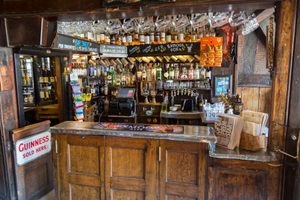The InterContinental Mark Hopkins San Francisco has perched at the top of Nob Hill for nearly a century. When it opened in 1926, it was more simply called the Hotel Mark Hopkins, named after the railroad executive that once built a home there.
The luxury hotel has hosted presidents, premiers, and all kinds of celebrities. But one famous group of visitors didn’t visit the hotel to stay in a suite. Throughout World War II, military personnel flocked there to take the elevator to the Top o’ the Mark, a bar on its 19th floor.
The Top o’ the Mark (or the Top of the Mark, as it’s usually written these days) was converted from a penthouse into what famous San Francisco journalist Herb Caen called “a glass-enclosed saloon” in 1939. People didn’t always head there for the drinks, he added. “The famed cocktail bar floats approximately fifty stories above sea level, and the view is so staggering (fifty miles in every direction) that alcoholic beverages seem superfluous.”
To the military personnel visiting during World War II, though, alcohol was not superfluous. The bar, with its lofty view of the ocean, became a symbolic place to drink before shipping out to the Pacific Theater. Life magazine published a story on the phenomenon in July 1944, noting how the bar’s clientele had turned over entirely. Once, it was “the exclusive night spot of San Francisco.” Instead, the journalist wrote, it was “patronized by beribboned servicemen,” and “democratically crowded to the walls.”
Crowded was an understatement. On busy nights, servicemen would wait hours in the hotel lobby to take the elevators up to the Top of the Mark. Some months would see as many as 30,000 military visitors to the hotel bar, where an unusual tradition sprang forth.
“One day, it’s rumored that an officer from a squadron bought a bottle of bourbon, wrote a note on it, attached it to the bottle, and left it with the bartender,” explains Connie Perez-Wong, creative director at the hotel. Any member of the squadron who came in could have a shot from the bottle. “The only caveat was that whoever had the last shot would need to buy the next bottle,” Perez-Wong says.
Servicemen who passed through San Francisco often promised to meet each other again at the Top of the Mark, and many did, making it a meaningful place of reunion and remembrance for those who didn’t return from the war. But eventually, Perez-Wong says, the custom stopped.
“I don’t know if it was actually stopped or it just died off,” she says. But the story “passed down through the different teams at the hotel.”

Then, in 2009, came the revival. According to Perez-Wong, a cadet named Lieutenant Mike Hall, who’d just graduated from Annapolis, came to the bar. “And at the time, the manager of the room knew about this tradition, and he told young Lieutenant Hall,” Perez-Wong says. “And Lieutenant Hall said, ‘By golly, we’ve got to get it restarted.’”
Lieutenant Hall bought a bottle and left it behind the bar. In the following years, the collection exploded. Today, guests stepping off the elevator into the Top of the Mark will be greeted by dozens of bottles, some in display cases, some on carts, all covered in notes and surrounded by photographs, badges, patches, and pins. Some notes contain well-wishes for those in active service, while others memorialize those who never came home. “We also have logbooks for anybody that wants to leave a story or leave a dedication,” says Perez-Wong.

Today, there’s about 80 bottles in the collection. Some of them will likely be gone soon, since it’s currently Fleet Week, when San Francisco welcomes Navy, Marine, and Coast Guard ships. Civilians can tour ships, listen to military bands, and watch an air show by the Blue Angels. The air show alone usually draws a million people to the city. Perez-Wong says the bar hosts an influx of guests during Fleet Week, as well.
Some of them might even buy a bottle to leave behind. Anyone can leave a bottle, and you don’t need to be part of a specific squadron to have a drink, either. “If you present a military ID, you can choose whichever bottle that you want to drink from, basically,” says Perez-Wong. As for what there is to drink, “the story is that it started with a bottle of bourbon,” she says. “So the majority would be either whiskey or bourbon, but we’ve had purchases of vodka [and] gin. It runs the gamut now.”



